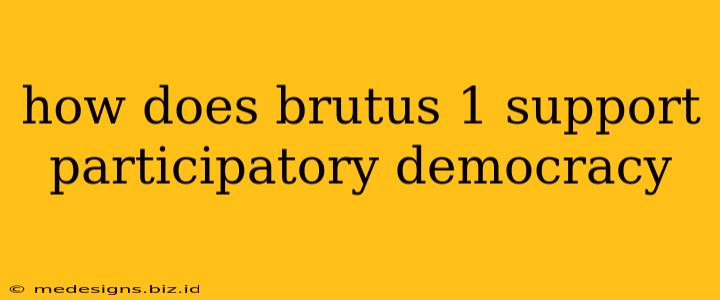Brutus No. 1, an anti-Federalist essay published in 1787, might seem an unlikely champion of participatory democracy. After all, it vehemently opposed the ratification of the United States Constitution. However, a closer examination reveals that its arguments, while ultimately advocating for a different form of government, implicitly support certain core tenets of participatory democracy. Understanding this requires dissecting Brutus's central concerns and analyzing how they relate to citizen involvement in government.
Brutus No. 1's Core Arguments Against the Constitution
Brutus No. 1 primarily argues against the proposed Constitution on the grounds that it would create a consolidated government too powerful for a vast republic. Its main points include:
-
Excessive Power of the Federal Government: Brutus feared the concentration of power in a distant, centralized government, arguing that it would inevitably lead to tyranny and the erosion of individual liberties. He believed a large republic was inherently unsuitable for direct citizen participation.
-
Lack of Representation: He argued that the representatives elected to the federal government would be too distant and unaccountable to the people, lacking the intimate connection necessary for true representation. This concern is directly related to the effectiveness of participatory democracy.
-
Potential for Abuse of Power: Brutus warned of the potential for the federal government to use its power to suppress dissent and infringe upon the rights of citizens. This highlights the importance of mechanisms for citizen oversight and control that are central to participatory democracy.
The Implicit Support for Participatory Democracy
While Brutus No. 1 opposed the Constitution's proposed structure, its underlying concerns reveal a strong, albeit indirect, commitment to participatory democracy. Let's examine how:
1. Emphasis on Citizen Agency:
Brutus's passionate defense of smaller, more localized governments inherently champions citizen agency. He believed that in smaller republics, citizens could have a more direct voice in their government, actively shaping laws and policies. This emphasis on active citizen involvement is a cornerstone of participatory democracy.
2. Critique of Ineffective Representation:
Brutus's criticism of the proposed Constitution's system of representation wasn't just a critique of the structure; it was a call for a system that truly reflects the will of the people. His concern highlights the importance of mechanisms that ensure representatives are accountable to their constituents – a key element of effective participatory democracy.
3. Fear of Tyranny and the Importance of Checks and Balances:
Brutus's fear of centralized power and tyranny indirectly supports the need for a system with strong checks and balances – a system where citizens can actively participate in oversight and hold their government accountable. This resonates with the spirit of participatory democracy, which emphasizes citizen vigilance and engagement in preventing abuse of power.
Conclusion: A Paradoxical Advocate
Brutus No. 1, while opposing the Constitution, inadvertently reinforces the importance of certain aspects of participatory democracy. Its arguments against a large, centralized government emphasize the need for citizen agency, effective representation, and mechanisms for checks and balances – all crucial elements for a system where citizens actively participate in shaping their own governance. While Brutus advocated for a different model, his concerns highlight the enduring importance of citizen engagement in a truly democratic system. The essay serves as a reminder that the debate over the ideal form of government continues to revolve around the fundamental question of how best to ensure meaningful citizen participation.
